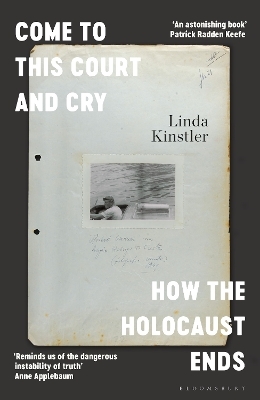
Come to This Court and Cry
How the Holocaust Ends
Seiten
2022
Bloomsbury Circus (Verlag)
978-1-5266-1258-8 (ISBN)
Bloomsbury Circus (Verlag)
978-1-5266-1258-8 (ISBN)
*A TABLET AND WALL STREET JOURNAL BOOK OF THE YEAR*
Shortlisted for the Wingate Literary Prize
‘A tremendous feat of storytelling, propelled by numerous twists and revelations, yet anchored by a deep moral seriousness . . . Enthralling‘ Guardian
‘Part detective story, part family history, part probing inquiry into how best to reckon with the horrors of a previous century . . . Astonishing‘ Patrick Radden Keefe, author of Empire of Pain
‘Outstanding‘ Philippe Sands, author of The Ratline and East West Street
___
To probe the past is to submit the memory of one's ancestors to a certain kind of trial. In this case, the trial came to me.
A few years ago Linda Kinstler discovered that a man fifty years dead – a former Nazi who belonged to the same killing unit as her grandfather – was the subject of an ongoing criminal investigation in Latvia. The proceedings threatened to pardon his crimes. They put on the line hard-won facts about the Holocaust at the precise moment that the last living survivors – the last legal witnesses – were dying.
Across the world, Second World War-era cases are winding their way through the courts. Survivors have been telling their stories for the better part of a century, and still judges ask for proof. Where do these stories end? What responsibilities attend their transmission, so many generations on? How many ghosts need to be put on trial for us to consider the crime scene of history closed?
In this major non-fiction debut, Linda Kinstler investigates both her family story and the archives of ten nations to examine what it takes to prove history in our uncertain century. Probing and profound, Come to this Court and Cry is about the nature of memory and justice when revisionism, ultra-nationalism and denialism make it feel like history is slipping out from under our feet. It asks how the stories we tell about ourselves, our families and our nations are passed down, how we alter them, and what they demand of us.
'Kinstler reminds us of the dangerous instability of truth and testimony, and the urgent need, in the twenty-first century, to keep telling the history of the twentieth' Anne Applebaum
'A masterpiece' Peter Pomerantsev
Shortlisted for the Wingate Literary Prize
‘A tremendous feat of storytelling, propelled by numerous twists and revelations, yet anchored by a deep moral seriousness . . . Enthralling‘ Guardian
‘Part detective story, part family history, part probing inquiry into how best to reckon with the horrors of a previous century . . . Astonishing‘ Patrick Radden Keefe, author of Empire of Pain
‘Outstanding‘ Philippe Sands, author of The Ratline and East West Street
___
To probe the past is to submit the memory of one's ancestors to a certain kind of trial. In this case, the trial came to me.
A few years ago Linda Kinstler discovered that a man fifty years dead – a former Nazi who belonged to the same killing unit as her grandfather – was the subject of an ongoing criminal investigation in Latvia. The proceedings threatened to pardon his crimes. They put on the line hard-won facts about the Holocaust at the precise moment that the last living survivors – the last legal witnesses – were dying.
Across the world, Second World War-era cases are winding their way through the courts. Survivors have been telling their stories for the better part of a century, and still judges ask for proof. Where do these stories end? What responsibilities attend their transmission, so many generations on? How many ghosts need to be put on trial for us to consider the crime scene of history closed?
In this major non-fiction debut, Linda Kinstler investigates both her family story and the archives of ten nations to examine what it takes to prove history in our uncertain century. Probing and profound, Come to this Court and Cry is about the nature of memory and justice when revisionism, ultra-nationalism and denialism make it feel like history is slipping out from under our feet. It asks how the stories we tell about ourselves, our families and our nations are passed down, how we alter them, and what they demand of us.
'Kinstler reminds us of the dangerous instability of truth and testimony, and the urgent need, in the twenty-first century, to keep telling the history of the twentieth' Anne Applebaum
'A masterpiece' Peter Pomerantsev
Linda Kinstler is a contributing writer at the Economist's 1843 magazine. Her coverage of European politics, history and cultural affairs has appeared in the Atlantic, New York Times, Guardian, Wired, Jewish Currents and more. She is a PhD Candidate in Rhetoric at UC Berkeley and previously studied in the UK as a Marshall Scholar. She has received numerous fellowships and awards and has appeared on NPR, the BBC, CNN and MSNBC, among others. She lives in Washington, DC.
| Erscheinungsdatum | 17.05.2022 |
|---|---|
| Verlagsort | London |
| Sprache | englisch |
| Maße | 153 x 234 mm |
| Themenwelt | Literatur ► Biografien / Erfahrungsberichte |
| Literatur ► Essays / Feuilleton | |
| Sachbuch/Ratgeber ► Geschichte / Politik | |
| Geschichte ► Allgemeine Geschichte ► Neuzeit (bis 1918) | |
| Geschichte ► Allgemeine Geschichte ► 1918 bis 1945 | |
| Geschichte ► Teilgebiete der Geschichte ► Militärgeschichte | |
| Geisteswissenschaften ► Religion / Theologie ► Judentum | |
| ISBN-10 | 1-5266-1258-5 / 1526612585 |
| ISBN-13 | 978-1-5266-1258-8 / 9781526612588 |
| Zustand | Neuware |
| Informationen gemäß Produktsicherheitsverordnung (GPSR) | |
| Haben Sie eine Frage zum Produkt? |
Mehr entdecken
aus dem Bereich
aus dem Bereich
Giordano Bruno - ein ketzerisches Leben
Buch | Hardcover (2024)
C.H.Beck (Verlag)
CHF 41,85
das dramatische 16. Jahrhundert
Buch | Hardcover (2024)
Rowohlt Berlin (Verlag)
CHF 47,60


